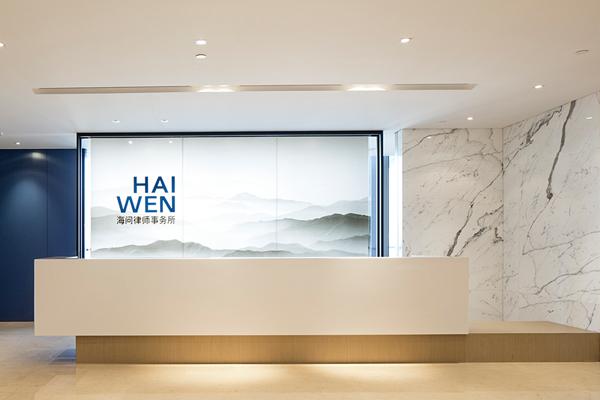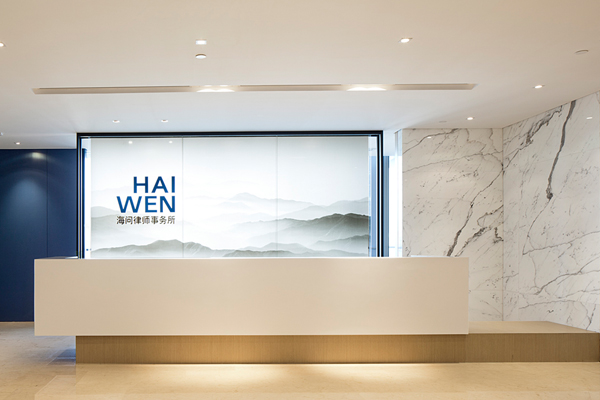
Two of this year’s ALB China Law Awards, namely, China Deal of the Year and M&A Deal of the Year, went to Haiwen & Partners. Zhang Jiping, director of Haiwen, talks to Li Shangjing about the firm’s history, reform of its profit-sharing system, development initiatives and corporate culture.
ALB: How many phases has Haiwen experienced along her way of development since foundation in 1992? Could you briefly describe the corporate culture of Haiwen?
Zhang: There are different angles to see development phases. In terms of business growth, I can say we have experienced three phases. In the first decade, we were mainly focused on securities-related business and disputes settlement while also involved in foreign investment and general company issues as a sideline. That phase approximately lasted from 1992 to 2003. 2004 marked the beginning of the second phase, in which we began to enter the M&A field by building on our achievements made in the initial decade. Actually it’s in line with China’s economic development and growth of the legal service sector, as Chinese government began to allow existing domestic companies to be purchased or merged by foreign ones in 2003, along with the surge of Greenfield investment, and private funds also began to burgeon and mushroom then. Actually our revenue from M&A business has overtaken that from capital market business many years ago. M&A is our biggest segment now, which involves the incorporation of private funds, VE/PE or quasi-PE investment, foreign merger, overseas investment, merger of domestic private companies, major assets reorganization of domestic public companies and back door listing. It’s been the third phase since 2014, in which we have further diversified our business structure on the basis of the previous two decades. We began to focus on assets management and ABS sectors three years ago once we became aware of the signs of their flourish. Now our new business units such as IP, real estate, taxation, movie& TV& entertainment are also being established. Diversification allows us to better meet customers’ demands by providing them with more thoughtful one-stop service.
In terms of profit sharing system among partners, there’s also been some different phases. For a very long time before 2008, we were practicing sort of a semi-socialist semi-capitalist system, which means all the costs were burdened by the firm while partners’ income was linked with their performance. From 2009 to 2014, we adopted “Pure Lockstep”. Then since 2015 it’s changed into Modified Lock Step. If you look round, you’ll find that almost none of the international big firms adopt “Eat What You Kill” system in profit sharing, which is pretty common among Chinese law firms. So we believe we are ahead of others in this respect.
As for corporate culture, Haiwen values the virtues of being modest, unassuming and working hard. Just as what Mr. Gao Xiqing, the founder of Haiwen, once said: “Haiwen has carried on its culture of ‘being modest and unassuming’ to today. Perhaps it’s not energetic or aggressive enough, but on the other hand, that’s exactly why it can be deeply rooted in Haiwen for so long and helps maintain a close relationship among Haiwen’s staff members.” That’s quite true. No matter how our system has been changed, our culture just keeps our partners and employees on good terms with each other and sticking to good teamwork spirit. That really makes us proud.
ALB: Could you talk about Haiwen’s current management structure? Have you found a system which fits you the best after changing from “lockstep” to “modified lockstep”?
Zhang: Haiwen adopts a flat management structure. Our management committee is composed of 5 partners, under which several special committees are set to take charge of administration, finance, IT, recruitment, lawyers, business expansion, PR, knowledge management and legal opinion respectively. Such a structure had been in existence as early as years ago when we practiced “Pure Lockstep”.
For a law firm, profit sharing system among partners is of critical importance as it determines many fundamental issues such as the collaboration model among partners, cost bearing and control and how to develop new internal and external partners. I know that many people refer to some law firms as “partnership” and others as “company”. I’m quite confused. Isn’t it true that all partners-based law firms are partnerships? To my limited knowledge, in the UK and the US, they usually distinguish between “Lockstep” and “Eat What You Kill”. I’ve been aware that, in China, under the system of “Eat What You Kill”, or the so-called “partnership” system, the usual practice is that each partner works alone and bears cost for itself and there’s hardly any close cooperation among partners though the size of the law firm can be very big. If you take a look at the big law firms of the UK and the US, including those several dozens which have offices in China, you will find that “partnership” is almost untraceable in such countries. It’s hardly possible for a firm with isolated partners to provide customers with satisfying service as more and more customers are demanding diversified one-stop service now given the market featuring changeable economic situation, laws and increasingly complicated transactions. Those with partners working closely together as a united whole will get the upper hand in competition and achieve better results in the future.
We were hoping to further consolidate our partners so as to better serve our clients when we adopted “Pure Lockstep”. But years later, in spite of everything, we found “Lockstep” unhelpful for us to bring in new external partners and, to a certain extent or within a certain time span, motivate our partners. We actually had made some assessment on this when we first adopted “Lockstep” and knew that it would take time to know whether it’d be an appropriate system or not. Last year, we adjusted “Pure Lockstep” by taking in such new weighting factors as revenue and management and so on, hoping it may help us solve the problems under “Pure Lockstep” system. And it works so far.
ALB: What’s your recent move on training and salary for junior lawyers? Could you please share your training experience with me?
Zhang: Haiwen has always offered competitive salary. We considerably increased our lawyers’ pay last year. Apart from meal allowance, we also effect commercial medical insurance for our mid-level and senior lawyers. Besides, we are committed to helping our assistant lawyers lead a decent life and providing them with a pleasing working environment and good training opportunities so that they may get professionally prepared and learn good skills for their future career, no matter what will become of them, whether a partner of us or do a legal or other jobs. Knowledge is no burden, anyway!
I think the best training is to test them directly on cases. We assign a guide or “master” to each of our entry-level lawyers so that such young people can have opportunity to learn more quickly and follow through cases, which is very helpful for enhancing their ability in exerting holistic control on a case and improving professional skills as well. We also arrange regular and irregular training sessions on legal skills and theories. Moreover, through our Knowledge Management Section under IT Unit, which is a platform for experience and knowledge sharing, our lawyers, including the younger ones, can quickly get help for any problems they have. I think there’re still a lot of things to do as to how to share knowledge and experience through training and how to strengthen teamwork building and improve efficiency.
ALB: I’ve learned that Haiwen Shenzhen Office was set recently. I also know that contrary to other firms with extensive presence, Haiwen now only has offices set in Beijing, Shanghai and Shenzhen. In eyes of others, you are rather reserved in terms of expansion. How do you comment on that?
Zhang: It’s true that Haiwen has not been aggressive enough in terms of expansion considering that we are among the oldest partners-based law firms in China. We ourselves have also been aware of that. So far our expansion mechanism has been internal promotion and bringing in external partners. We don’t expand through merger with or acquisition of another law firm or a whole team or through alliance with other law firms of various provinces. When bringing in external partners, compared with professional skills and business ability, we value more their attitude toward Haiwen’s corporate culture and platform. Good business alone doesn’t qualify one as our partner. What we really hope to have is people who have the same ambition as we do so that we may work together to build Haiwen into a great platform and a longstanding business which make us proud for a lifetime; we don’t just seek intermediate interests. Of course, in response to the increasingly intense market competition, we have actually quickened our step in bringing in great external partners. We’ve been doing so for years and our size has been expanding, too.
We will also move faster than before to expand our geographical footprint. As you mentioned, we’ve set Shenzhen office at the end of last year. Now we are planning to set an overseas office. The top choice is Hong Kong, of course. I know that quite a few brother firms have set branches in Hong Kong, the US and European countries. We have our own judgment in this respect. I think the key is one’s ability to take care of cases from high-end clients in overseas market. The overseas footprint of British and American law firms is always accompanied by that of clients. Of course, the close relationship between laws of the former British colonies and those of the UK itself has also contributed to the global expansion of British law firms. Today, Chinese enterprises’ cross-border M&A activities and ever-increasing international influence are bringing unprecedented opportunities for Chinese law firms to expand in overseas. Moreover, business growth and a large pool of talented lawyers with international vision and ability also make such expansion possible for Chinese law firms. We will seize such opportunities and quick our steps to expand overseas.
ALB: According to your development strategy, on which sectors will you focus in the years to come?
Zhang: We hope we can seize opportunities in the emerging sectors. In addition to capital market, investment and M&A and dispute settlement, which we are pretty good at, we’ve also been making efforts to do business in new areas. For instance, in the past two years we’ve brought in partners of such sectors as IP, movie& film& entertainment and taxation. We believe such new areas are all “blue ocean” areas and promise great growth potential. Besides, with financing instruments on the market and customer demands becoming more and more diversified, we are also taking initiative to develop business related to assets management and REITs ABS and have been doing well so far. Furthermore, we are also interested in business of such segments as FCPA, network security, bankruptcy and reorganization and make efforts to enhance our ability in dealing with anti-monopoly and lawsuits. All in all, we are pretty open-minded and positive about the emerging sectors, as is demonstrated by our adjustment of our partnership system, which makes it more convenient for us to bring in new partners.



